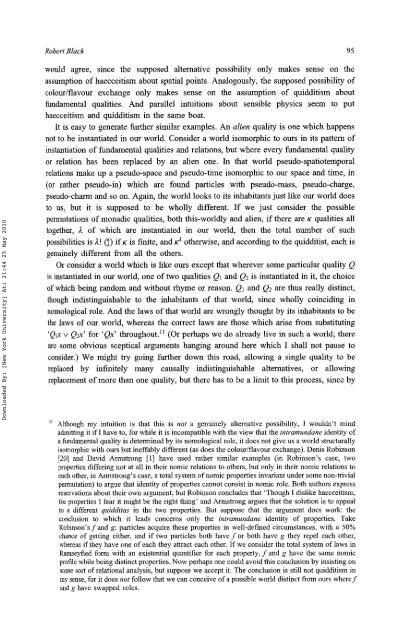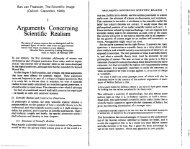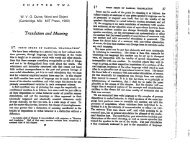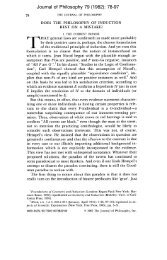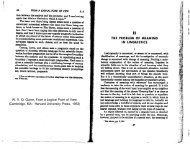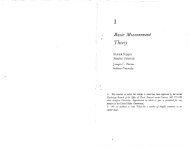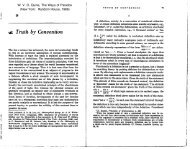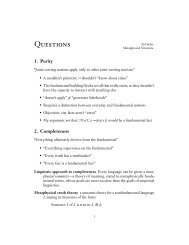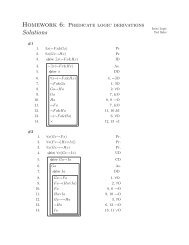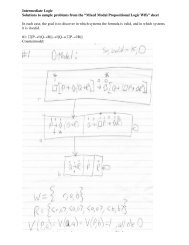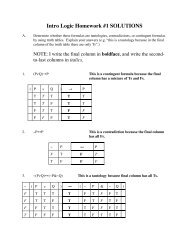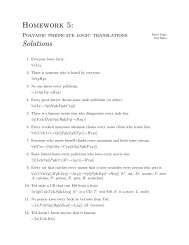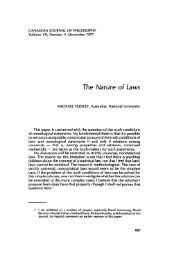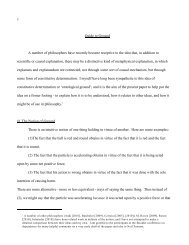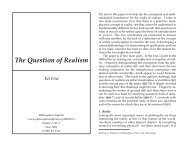Black - against quidditism.pdf - Ted Sider
Black - against quidditism.pdf - Ted Sider
Black - against quidditism.pdf - Ted Sider
Create successful ePaper yourself
Turn your PDF publications into a flip-book with our unique Google optimized e-Paper software.
Downloaded By: [New York University] At: 21:44 25 May 2010<br />
Robert <strong>Black</strong> 95<br />
would agree, since the supposed alternative possibility only makes sense on the<br />
assumption of haecceitism about spatial points. Analogously, the supposed possibility of<br />
colour/flavour exchange only makes sense on the assumption of <strong>quidditism</strong> about<br />
fundamental qualities. And parallel intuitions about sensible physics seem to put<br />
haecceitism and <strong>quidditism</strong> in the same boat.<br />
It is easy to generate further similar examples. An alien quality is one which happens<br />
not to be instantiated in our world. Consider a world isomorphic to ours in its pattern of<br />
instantiation of fundamental qualities and relations, but where every fundamental quality<br />
or relation has been replaced by an alien one. In that world pseudo-spatiotemporal<br />
relations make up a pseudo-space and pseudo-time isomorphic to our space and time, in<br />
(or rather pseudo-in) which are found particles with pseudo-mass, pseudo-charge,<br />
pseudo-charm and so on. Again, the world looks to its inhabitants just like our world does<br />
to us, but it is supposed to be wholly different. If we just consider the possible<br />
permutations of monadic qualities, both this-worldly and alien, if there are ~: qualities all<br />
together, 2 of which are instantiated in our world, then the total number of such<br />
possibilities is 2! (,~) if t0 is finite, and x a otherwise, and according to the quidditist, each is<br />
genuinely different from all the others.<br />
Or consider a world which is like ours except that wherever some particular quality Q<br />
is instantiated in our world, one of two qualities Qa and Q2 is instantiated in it, the choice<br />
of which being random and without rhyme or reason. Q1 and Q2 are thus really distinct,<br />
though indistinguishable to the inhabitants of that world, since wholly coinciding in<br />
nomological role. And the laws of that world are wrongly thought by its inhabitants to be<br />
the laws of our world, whereas the correct laws are those which arise from substituting<br />
'Q~x v Qzx' for 'Qx' throughout. H (Or perhaps we do already live in such a world; there<br />
are some obvious sceptical arguments hanging around here which I shall not pause to<br />
consider.) We might try going further down this road, allowing a single quality to be<br />
replaced by infinitely many causally indistinguishable alternatives, or allowing<br />
replacement of more than one quality, but there has to be a limit to this process, since by<br />
II Although my intuition is that this is not a genuinely alternative possibility, I wouldn't mind<br />
admitting it ifI have to, for while it is incompatible with the view that the intramundane identity of<br />
a fundamental quality is determined by its nomologieal role, it does not give us a world structurally<br />
isomorphic with ours but ineffably different (as does the colour/flavour exchange). Denis Robinson<br />
[20] and David Armstrong [1] have used rather similar examples (in Robinson's case, two<br />
properties differing not at all in their nomic relations to others, but only in their nomic relations to<br />
each other, in Armstrong's case, a total system of nomic properties invariant under some non-trivial<br />
pelTnutation) to argue that identity of properties cannot consist in nomic role. Both authors express<br />
reservations about their own argument, but Robinson concludes that 'Though I dislike haecceitism,<br />
for properties ~ fear it might be the right thing' and Armstrong argues that the solution is to appeal<br />
to a different quidditas in the two properties. But suppose that the argument does work: the<br />
conclusion to which it leads concerns only the intramundane identity of properties. Take<br />
Robinson'sfand g: particles acquire these properties in well-defined circumstances, with a 50%<br />
chance of getting either, and if two particles both have f or both have g they repel each other,<br />
whereas if they have one of each they attract each other. If we consider the total system of laws in<br />
Ramseyfied form with an existential quantifier for each property, f and g have the same nomic<br />
profile while being distinct properties. Now perhaps one could avoid this conclusion by insisting on<br />
some sort of relational analysis, but suppose we accept it. The conclusion is still not <strong>quidditism</strong> in<br />
my sense, for it does not follow that we can conceive of a possible world distinct from ours wheref<br />
and g have swapped roles.


